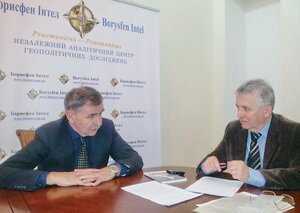
|
Born August 13, 1953. |
“Just now Europeans really feel the breath of the coming war”
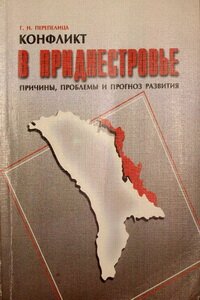
- Here it is necessary to bear in mind the interests of Russia. Because all these conflicts we have got on post-Soviet territories, have been generated by the RF. If it were not for Russia, there would be no escalation using weapons. I am stating this with full responsibility, as a scientist, who studied the armed conflicts in the CIS, the Balkans (including the first Chechen war) and has written his conclusions in monographs. By the way, the subject of my Doctoral dissertation is “Methodology of Researches for Resolving of Armed Conflicts”. So, if we want to objectively analyze the Trans-Dniestr conflict, we need to do it through the prism of Russia's geopolitical interests.
- The complexity of the situation is also in the fact that in it are intertwined interests not just of Russia alone, but also of Ukraine, Moldova, and Romania (in fact of the EU).
- Take into account that this conflict was planned in Soviet times, when they were deciding how to stop the process of sovereignization of Soviet republics. This process was initiated by the so-called perestroika (reformation period), which provided for giving up the ideology of the Communist Party and transition to a market economy on the concept of convergence. This concept had been very well developed by both, Soviet and Western political scientists. It was borrowed from the Western political science. What policy did they try to develop in the time of Gorbachev? A policy to save the Soviet Union, having radically transformed it. First of all, having transformed the political system, to abandon the authoritarian system and move on to the principle of dividing political power between certain branches. Secondly, — to move from command-administrative economy to a market economy, as the command-administrative economic system demonstrated its inadequacy in the 70-ies of the last century. But is market economy possible without private ownership? Who can be a private owner? Who — subjects of this private ownership? After all, without private owners a market economy is impossible in principle.
- And private owners are the so-called elite!
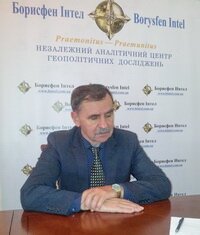 - Yes, the “elite”. Therefore, the task of perestroika was to move the party nomenclature out of the party seats into the chairs of business managers. Party nomenclature was being prepared for the role of private owners, and thus had to change its political job to business. Public resources were passed into the hands of private owners. But when this process began, the Republican nomenclature saw that the assignment will not go bottom-upwards, but top-downwards, through the central political power, which was in Moscow, and not, for example, in Kiev or Alma-Ata. Hence, it automatically put on the agenda the question of the sovereignization of Soviet republics. How to avoid it? To sign a new union treaty. But how? After all, part of the nomenclature (such as Scherbytskyi, Lukyanov) did not take Gorbachev's perestroika, kept defending command-administration economy, state ownership of the means of production and of resources. But in the nomenclature there were also those who did not mind to exchange their official GAZ-24 for a Mercedes, to get hold of a lot of money in the accounts in foreign banks, the origin of which no one could trace. To prevent this process, it was decided to re-sign a treaty of alliance. But as republican elites were against this re-signing, Moscow decided to “blow up” the republics. That is to do so that instead of 15 republics there would be 50 subjects of the Soviet Union. And then they had to think hard what could be so to speak blown up or destabilized. Apart from Moldova, for example, were determined two subjects — the territory of Trans-Dniestr and the territory of Gagauzia. Although by a long stretch of the imagination, but it was possible to prove that those areas fell under the principle of self-determination. The KGB contributed, preparing the appropriate situation. In Ukraine, the Crimea became such a subject. And Kiev, on orders from Moscow, gave it the status of autonomy, which until that time the Peninsula had not had. In Georgia (which was believed to be the most rebellious republic), four such subjects were supposed to be created: Georgia, South Ossetia, Abkhazia and Adjara. With the help of special services there began the movement for “independence” in order to counter these “movements” to new independent states. In case if, say, Ukraine does not sign a new agreement, the Crimea will. If Georgia does not sign, Abkhazia or South Ossetia will. If Chisinau does not sign, Tiraspol or Gagauzia will do it. And if the two entities signed an agreement, there would be no escaping for Chisinau. And so on. And then the question will arise: who is driving whom? For example, will the Moldavian Republic be eliminated, or should it also sign the new treaty of alliance. That's how began this process initiated in the Soviet times, and subsequently intercepted by Russia.
- Yes, the “elite”. Therefore, the task of perestroika was to move the party nomenclature out of the party seats into the chairs of business managers. Party nomenclature was being prepared for the role of private owners, and thus had to change its political job to business. Public resources were passed into the hands of private owners. But when this process began, the Republican nomenclature saw that the assignment will not go bottom-upwards, but top-downwards, through the central political power, which was in Moscow, and not, for example, in Kiev or Alma-Ata. Hence, it automatically put on the agenda the question of the sovereignization of Soviet republics. How to avoid it? To sign a new union treaty. But how? After all, part of the nomenclature (such as Scherbytskyi, Lukyanov) did not take Gorbachev's perestroika, kept defending command-administration economy, state ownership of the means of production and of resources. But in the nomenclature there were also those who did not mind to exchange their official GAZ-24 for a Mercedes, to get hold of a lot of money in the accounts in foreign banks, the origin of which no one could trace. To prevent this process, it was decided to re-sign a treaty of alliance. But as republican elites were against this re-signing, Moscow decided to “blow up” the republics. That is to do so that instead of 15 republics there would be 50 subjects of the Soviet Union. And then they had to think hard what could be so to speak blown up or destabilized. Apart from Moldova, for example, were determined two subjects — the territory of Trans-Dniestr and the territory of Gagauzia. Although by a long stretch of the imagination, but it was possible to prove that those areas fell under the principle of self-determination. The KGB contributed, preparing the appropriate situation. In Ukraine, the Crimea became such a subject. And Kiev, on orders from Moscow, gave it the status of autonomy, which until that time the Peninsula had not had. In Georgia (which was believed to be the most rebellious republic), four such subjects were supposed to be created: Georgia, South Ossetia, Abkhazia and Adjara. With the help of special services there began the movement for “independence” in order to counter these “movements” to new independent states. In case if, say, Ukraine does not sign a new agreement, the Crimea will. If Georgia does not sign, Abkhazia or South Ossetia will. If Chisinau does not sign, Tiraspol or Gagauzia will do it. And if the two entities signed an agreement, there would be no escaping for Chisinau. And so on. And then the question will arise: who is driving whom? For example, will the Moldavian Republic be eliminated, or should it also sign the new treaty of alliance. That's how began this process initiated in the Soviet times, and subsequently intercepted by Russia.
- In what way?
- It is no accident that V. Putin calls the collapse of the Soviet Union a geopolitical catastrophe. Because at the beginning of this process, Boris Yeltsin and the so-called democratic elite of Russia could not even imagine how Ukraine could be let go. It was like the core of the large Russia state, its cradle! Therefore, it does not occur to Moscow, not even for one shortest minute that Ukraine will not return into the post-Soviet space. Russians are convinced that the new state should be built within the framework of the Soviet Union.
- But the leadership of newly formed states had to support these Moscow's aspirations.
- At that time the party elite did not think in the scale of state sovereignty, it needed it not as a value, but as a means of appropriation of the resources available, for example in Ukraine or Moldova. As a means of taking what remained within the former republics. After all, privatization, as I have just mentioned, was to be done from the “top”, on instructions from Moscow, because all resources — Kyiv plant “Bolshevik”, Kharkov Malyshev factory, enterprises of Trans-Dniestr and so on — they all were subordinated to Ministries situated in Moscow. Consequently, privatization had to be done by Ministry officials. Then Malyshev factory, for example, will not go to Ukraine, it will belong to Russian owners. This is what, by the way, is happening before our eyes today when Russian businessmen come (and sometimes one cannot tell whose they are and from where they are coming), and soon our company get pocketed by Russia.
- Excuse me, please, but sometimes it seems that the entire property is in the hands of Russia anyway, without passports of private owner. That is why now Ukraine, is countering Moscow's desire to play the master at all our businesses and industries, to dispose of income on its own.
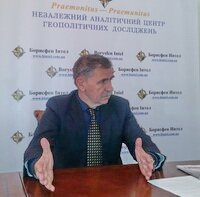 - Because the Ukrainian leadership, which had been “ruling” Ukraine for the last two decades, absolutely did not need its sovereignty. For it, sovereignty was a commodity. “If you give me for Ukrainian resources as much as I want to, or even more, I will give away this sovereignty”. V. Yanukovych was haggling over the price, selling our sovereignty. But V. Putin wanted it for next to nothing. He openly spoke about this. And D. Medvedev spoke about this May 17, 2010, when Ukrainian oligarchs asked him if the Russian market would open for them, and whether would be preferences for our products, and so on. “After all, Ukraine declared its non-aligned status, is not integrating into the EU”. D. Medvedev was surprised: what are you talking about? Everything around is ours! You are just using it temporarily, because you have stolen it from us, but eventually everything located in Ukraine, you will give to us.
- Because the Ukrainian leadership, which had been “ruling” Ukraine for the last two decades, absolutely did not need its sovereignty. For it, sovereignty was a commodity. “If you give me for Ukrainian resources as much as I want to, or even more, I will give away this sovereignty”. V. Yanukovych was haggling over the price, selling our sovereignty. But V. Putin wanted it for next to nothing. He openly spoke about this. And D. Medvedev spoke about this May 17, 2010, when Ukrainian oligarchs asked him if the Russian market would open for them, and whether would be preferences for our products, and so on. “After all, Ukraine declared its non-aligned status, is not integrating into the EU”. D. Medvedev was surprised: what are you talking about? Everything around is ours! You are just using it temporarily, because you have stolen it from us, but eventually everything located in Ukraine, you will give to us.
- In fact, the statehood of newly formed countries does not let the Russian capital do its stuff?
- Exactly! That is why our elite considers the statehood as a commodity protecting their own private property. Therefore, sovereignty is subject to shameless trade. Kharkiv agreements are an eloquent example. Today we also see decisions taken not in favor of our country. That's the trouble. Because something has to come a new national elite, for which state sovereignty is a real value, and not an ordinary commodity. Maidan today shows that the new generation is on its way, and the first echelon of this generation has entered the Verkhovna Rada.
- In your book you say that Ukrainian statehood reflects mentality of a Ukrainian. It is hard to disagree with you. For example, Ukrainians in the East gravitate towards Russia, in the West — towards Europe.
- Of course, politics inherent national features. You see, with the sovereignty we got not a ready Ukrainian state, but the Soviet Ukraine. With the managerial elite, which was at the time, with the population having the Soviet mentality, paternalistic attitudes. After all, our national consciousness for many years, not only in the Soviet times, but under the tsars, had been suppressed and to feel Ukrainian was very difficult. The Communist Party pursued a policy of denationalization, turning the population into a Soviet-Russian people. Russian mentality was implanted to this people. And we've got a nation in which a part of Ukrainians considered themselves Ukrainians, and the other part — hated everything Ukrainian because this part was Russified. And now in the East of Ukraine, as well as in Trans-Dniestr, the population has Soviet mentality, for which the highest value is the sausage at two twenty a kilo. And nothing apart from that. Such a citizen agrees to receive his/her pension, although minimal. He/she is glad that not only he/she trudges along in this life, — his neighbor trudges too. “We are friends with the neighbor, we have no animosity. We live in a powerful country that has a lot of powerful missiles and tanks, and it can intimidate everybody, and no one will touch us because we rule the world about”. That's how this community thinks. It is absolutely paternalistic! Its gene of slavery has been evolving for a long time. This is how an authoritarian state breeds generations of obedient slaves, completely satisfying that state. They give up their freedom for a package of buckwheat. Look at the history of mankind, there are many such examples. In the 19th century, during the Civil War, slaves of the South of the United States, led by slaveholders fought with the industrial North, defending slavery. And when the Americans of the North, as representatives of the new capitalist relations, won, the huge masses of slaves suddenly became useless. They begged, because apart from physical slave work they were not taught anything else. We can see something very similar in the Donbas. As well as in Trans-Dniestr.
- Did the previous leadership of our state realize it?
- You see, we have inherited the state as a Soviet republic without any changes. Our SBU remained what it was — a branch of KGB. The Soviet Armed Forces, in the ranks of which we served, remained Soviet, although their name has been changed. Even the language remains the same! For example, in our Armed Forces, it dominates. All our secret services operate in accordance with the Soviet-Russian traditions. The management is the same, management mechanisms are the same. And so are decrees and orders.
- What, then, was a special feature of Trans-Dniestr?
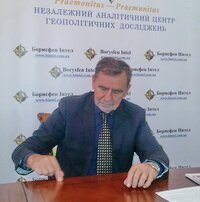 - In Trans-Dniestr, everything remains absolutely Soviet. The linguistic and economic factors are the basis of all relationships there. When in Moldova privatization process began, the local leadership tried to separate the local system of property from Moscow. When it began to “cut” the property pie” at the level of the republic, the local Trans-Dniestr leadership was not in a hurry to share it with Chisinau. (This was the case in Ukraine, when the “Donetsk guys” began to oppose themselves to the Kiev authorities). They said who are you, Moldova? “You are Romanians, with whom we cannot have no common affairs, the economic potential of Trans-Dniestr does not belong to you. Trans-Dniestr occupies 12 % of the territory of Moldova, and provides 35 % of GDP. 70 % of the industry of Moldova is located in Trans-Dniestr, so we are to lead here. And we take all the property — plants, companies, military plants, military units. We will do business with Russia, which will provide us with everything”.
- In Trans-Dniestr, everything remains absolutely Soviet. The linguistic and economic factors are the basis of all relationships there. When in Moldova privatization process began, the local leadership tried to separate the local system of property from Moscow. When it began to “cut” the property pie” at the level of the republic, the local Trans-Dniestr leadership was not in a hurry to share it with Chisinau. (This was the case in Ukraine, when the “Donetsk guys” began to oppose themselves to the Kiev authorities). They said who are you, Moldova? “You are Romanians, with whom we cannot have no common affairs, the economic potential of Trans-Dniestr does not belong to you. Trans-Dniestr occupies 12 % of the territory of Moldova, and provides 35 % of GDP. 70 % of the industry of Moldova is located in Trans-Dniestr, so we are to lead here. And we take all the property — plants, companies, military plants, military units. We will do business with Russia, which will provide us with everything”.
It could come to domestic abuse. How was Trans-Dniestr population mobilized? With the help of the language, as we have seen it in Donbas and in the Crimea. The language, as we have seen, is a very important factor in nation building. As well as in its division.
- It is like a password.
- Yes, it can be considered a kind of password. The language is a meaning carrier. Speaking the same language we understand each other perfectly well, so we think in the same way, which is confirmed by our unity, we are colleagues, likeminded people. First in Moldova they did not pay attention to this. But when the Law on the State Language had been adopted, according to which the Moldovan language became the state language, a conflict arose because this step was seen as the language aggression. In the industrial area, which Trans-Dniestr is, they did not want to admit it because the population was mainly like ours in the Donbas. The Moldovan language was generally considered Romanian, unlike Russian, which was the language of Pushkin's masterpieces... The first meeting of protest was held in the village Parkany, and Tiraspol's nomenclature, headed by Smirnov, quickly caught it and began to big up the language problem. Exactly as it is bigged up in the Donbas. The language actually mobilized the population around the Trans-Dniestr party-industrial nomenclature.
Remember, in the Donbas, after Yanukovych had come to power, Russification began to grow. I remember at the Diplomatic Academy at the time the conference was held (scientific and diplomatic), where I gave a warning that we would have a problem similar to the Trans-Dniestr. Because then began “Transdniesterization” in Eastern Ukraine, its distinct division. After all, how is this “meal” served?” The Russian language is the language of the elite. It is the language of the whole world. And what is the Ukrainian language? The language of remnants of svidomits (from the Ukrainian “svidomyi” — conscious, aware), Banderites, marginalized declassed elements”. And it is constantly being imposed in all spheres of everyday life — in the media, on television, on radio. This cannot help provoking a conflict. Like, if your native language is not Russian, then you cannot be with me at the same social level. Because you are a nobody. And if you are a nobody, then you can be offended, even deprived of life, your property, because you do not deserve it.
Thus, we see that the language can serve as a conflict factor.
- Don't you think that we (meaning territories of the former CIS) have got so deep into these problems that have not noticed how we began to lag behind the rest of the world in our economic development? The consequences of this lagging behind may be irreversible. Indeed, because of the low economic level of our neighboring countries there are interstate conflicts. They turn into different confrontations, for example, into so-called “hybrid” wars, that are a sign of not only economic but also cultural underdevelopment of the state, inciting these wars. Personally I think that the “hybridity” is a kind of criminal war, brought to the interstate level by the weak state leadership. It's funny, when the Chief of General Staff of the Russian Armed Forces Gerasimov himself defines the characteristics of such a war — lies, propaganda, bribery. And where is the place of the officer's honor, patriotism, self-sacrifice for the sake of high ideals here?
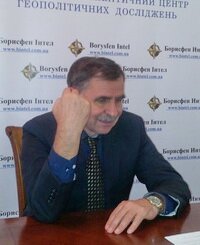 - Now the process of de-industrialization can be seen at in all post-Soviet territories. Again, we can take Trans-Dniestr as an example... Neither Russian democrats, reactionaries, cleptocrats, nor Russian nationalists and Russian imperialists — no one in Russia will for a shortest moment would believe that Ukraine will become an independent state. B. Yeltsin once said that the Commonwealth of the former Soviet republics is a temporary association for their further reintegration. They will return to Russia. During Yeltsin's era, there reintegration associations were talked about. The CIS is a sort of a courtyard with a reliable fence, where Russia will gather all the CIS “chickens” who are not allowed to run out from that yard. If one of them makes such an attempt, for example, to join NATO, it will be subject to “shooting”. Because Russia considers these republics its absolute property. The main question for the RF is how to return this property? By eliminating their state sovereignty. Formally, they are subjects of international law, have the right to appeal to international organizations such as the UN. Under Yeltsin in Moscow there were two wings, offering a form of coexistence of the former Soviet republics. The liberal wing (Kozyrev, Chubais) was against radical actions, for the economic way of returning Russia's lost influence through a single state, which unites Belarus, Kazakhstan and so on. If you cannot arrange a single economic space, then the Customs Union was offered. Opponents of the liberals — and among them, Defense Minister Grachev — proposed to return everything by military force.
- Now the process of de-industrialization can be seen at in all post-Soviet territories. Again, we can take Trans-Dniestr as an example... Neither Russian democrats, reactionaries, cleptocrats, nor Russian nationalists and Russian imperialists — no one in Russia will for a shortest moment would believe that Ukraine will become an independent state. B. Yeltsin once said that the Commonwealth of the former Soviet republics is a temporary association for their further reintegration. They will return to Russia. During Yeltsin's era, there reintegration associations were talked about. The CIS is a sort of a courtyard with a reliable fence, where Russia will gather all the CIS “chickens” who are not allowed to run out from that yard. If one of them makes such an attempt, for example, to join NATO, it will be subject to “shooting”. Because Russia considers these republics its absolute property. The main question for the RF is how to return this property? By eliminating their state sovereignty. Formally, they are subjects of international law, have the right to appeal to international organizations such as the UN. Under Yeltsin in Moscow there were two wings, offering a form of coexistence of the former Soviet republics. The liberal wing (Kozyrev, Chubais) was against radical actions, for the economic way of returning Russia's lost influence through a single state, which unites Belarus, Kazakhstan and so on. If you cannot arrange a single economic space, then the Customs Union was offered. Opponents of the liberals — and among them, Defense Minister Grachev — proposed to return everything by military force.
The Russian elite believes that the Russian Federation is a vestige of the Soviet Union, and to drive Russia into the former format is nothing other than mockery. Therefore, they seek to renew the format of the Russian Empire. “If Russia is great — it must be great” — this is their geopolitical slogan. V. Putin said, “Russia will either be great, or it will not be at all”. So they set themselves the task to resume their territory within the borders of the Soviet Union. Perhaps they will let go some lagging behind republic in order not to support it, but with the rest of ex-Soviet republics they will want to do everything according to their imperial taste. Then such a state mass will be able to claim to be a world superpower, leading global processes. Then the Russian authorities will be able to be in control of the world's financial processes, resources, global economy. In the “Strategy of National Security of the Russian Federation until 2020”, these tasks are clearly specified. The “world state”, “the leader of the world economy”! How to become a leader with a backward economy, which has an archaic base? Only by means of war. Only this way the world order can be destroyed, the United States and China can be pushed away, economic chaos can be caused, and on this wave Russia can become at the head of the whole world.
- The West, of course, will not agree to this.
- We see that first the West wanted to negotiate. But it failed. The West cannot afford to give up its seat to Russia, it cannot take a back seat.
- And here began a conversation about national egoism, where each country cares about its own interests. Germans agreed to the construction of the Northern Stream, the EU believed that Georgia in 2008 attacked Russia, half of Europe believes that Ukraine is managing the Donbas by military methods, Serbia and Hungary are in favor of the Southern Stream, because it is profitable for them...
- This national egoism will break the whole world order. We have already seen this once, when the world was placating Hitler. France cared only about its national interests (“We do not touch Hitler — he will not touch us”) and so did Western Europe. They delivered up Poland, Czechoslovakia for the sake of Hitler's not touching them. And Great Britain was not in this case an exception, but after Prime Minister Chamberlain there appeared Prime Minister Churchill there...
- With such approaches Ukraine failed to become the state after the First World War, when the Allies did not support its quest for independence. And the price of the issue was oil districts in the Carpathians, which Ukrainians did not agree to give away to the West for military support.
- You are right calling this national egoism. Europe does not want to sacrifice anything. And who does not want to sacrifice little, will lose a lot more.
- Czechs before the Second World War had the most powerful army in Europe, but it did not dare to reign in the Germans.
- Yes, Hitler was a little afraid of that army. But Hitler was an adventurer. He knew very well that no one in the West would contradict him. He was afraid of the Munich Conference, where Europe could unite against him and protect the Sudeten and the whole Czechoslovakia. But in the end, largely thanks to Europe, he became triumphator for some time. So we cannot put high hopes on Europe.
- But Europe must realize that because of our military actions it will not live the usual life. What do you think: are changes possible? Our President, together with the Polish President traveled to Chisinau for a meeting with the Moldovan counterpart. Before that, there the Vyshegrad Group (V4) had given certain signals...
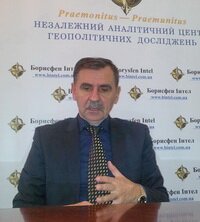 - Europe will surely face an immediate threat. This did happen before. But even now we can say that it is late in taking measures. And forget about the V4! It's gone. This is a geopolitical question: small states that received statehood due to certain geopolitical considerations, do not have geopolitical thinking, they have only their own interests, beyond which they will never be able to get out. If I may say so, they mentally feel their situatedness. In order to survive, they need to decide in time who is strong now and to join him. For example, the Romanian diplomacy is based on the art of search for suitable strong partners. In order to take their side. Or to leave those who are under attack. It is the policy of self-preservation. We have seen it in Hungary, the Czech Republic and Slovakia. Our faithful ally remains only Poland from this “four”, although it is pressured from two sides — from the West and from the East. Its elite very well remembers the words of Pilsudski that “without an independent Ukraine there cannot be a free Poland,” that the moment Ukraine falls, all threats will get right up close to Poland. Although at the moment such unanimity among the Polish elite is not observed. Tusk now is in Brussels, Komarovsky's term is coming to the end, and against him something is already being planned. A new generation is going to take power into its hands, and in our bilateral relations, it may try to change its vectors. Because it is amenable to the virus of European bureaucracy, where the interests of the native state are at the background. They are interested in questions of some bargaining, which is dangerous for both Poland and Ukraine. I consider Poland our most reliable ally, not our other western neighbors.
- Europe will surely face an immediate threat. This did happen before. But even now we can say that it is late in taking measures. And forget about the V4! It's gone. This is a geopolitical question: small states that received statehood due to certain geopolitical considerations, do not have geopolitical thinking, they have only their own interests, beyond which they will never be able to get out. If I may say so, they mentally feel their situatedness. In order to survive, they need to decide in time who is strong now and to join him. For example, the Romanian diplomacy is based on the art of search for suitable strong partners. In order to take their side. Or to leave those who are under attack. It is the policy of self-preservation. We have seen it in Hungary, the Czech Republic and Slovakia. Our faithful ally remains only Poland from this “four”, although it is pressured from two sides — from the West and from the East. Its elite very well remembers the words of Pilsudski that “without an independent Ukraine there cannot be a free Poland,” that the moment Ukraine falls, all threats will get right up close to Poland. Although at the moment such unanimity among the Polish elite is not observed. Tusk now is in Brussels, Komarovsky's term is coming to the end, and against him something is already being planned. A new generation is going to take power into its hands, and in our bilateral relations, it may try to change its vectors. Because it is amenable to the virus of European bureaucracy, where the interests of the native state are at the background. They are interested in questions of some bargaining, which is dangerous for both Poland and Ukraine. I consider Poland our most reliable ally, not our other western neighbors.
- Maybe all these “movements” can be explained by the short historical memory? Because Poland had for centuries been part of the Russian Empire, Hungary and the Czech Republic — part of the Austrian-Hungarian Empire.
- Most likely, this is because they very quickly forget about the events in Prague in 1968 and in Budapest in 1956...
- Does our current leadership takes into consideration lessons learned by our people?
- All the previous years of our latest statehood absolutely reflect our history. Our elite had been destroyed by the Russian Empire without a shadow of a doubt. And for individual representatives, who managed to survive, it was difficult to do something on their own. Russians lured some Ukrainians into service for a decent reward, and they forgot their duty of a Ukrainian. They forgot the language, did not want to think about their origins, etc.
Ukrainian elite tried to revive after the collapse of Tsarist Russia, the Soviet Union. Remember Hetman Skoropadsky, who was seeking his place within the new Ukraine after the overthrow of the tzar. Or what our generals did after the collapse of the Soviet army. Not all of them took worthy seats in Moscow, and they returned to their homeland. Belonging to the Ukrainian elite is not determined by the height of the legs of the office chair, but by how much you feel as one with the Ukrainian nation, historical memory, how clearly you understand what the value of your life as of a true Ukrainian's is.
Our Ukrainian Presidents originate from the party nomenclature stratum. What was it like? It was the party nomenclature, former Komsomol members included, which today continues to sit in the Parliament. True, at present it is not so numerous as it used to be, but it has the same not changing mentality. Leonid Kravchuk's followers are like him. Former high party members, leaders of large enterprises had divided state property and power, and thus “mounted” the state. But they still had to change Soviet laws, as they did not let them live and reign in a new way, any privatization was automatically becoming a crime. And eventually it all ended in crime took over the steering wheel of the country. In the economy, as well as in politics. Thus, at the stage of transition from the socialist economy to the capitalist one we have got, according to the definition of Polish political scientists, a transfer-class. This class is parasitic, its main interest is sharing out all that remained in the country. Suffice it to recall, how in the same Trans-Dniestr there appeared Corporation “Sheriff”, in whose hands was concentrated the whole local economy.
“Sharing out”, but not the development of the national economy...
…But not the development. How and what they do — we have just mentioned. They live by interests of privatization, and that is it. The transfer-class consists of three segments: the party nomenclature (party leaders), red directors (managers) and organized crime. We have representatives from every segment. The first President was the former party apparatchik Kravchuk. Kuchma was a representative of state bureaucracy, that is, of so-called red directors. Yanukovych was a representative of the third segment. Those three are the whole 23 years of the historical path of our Ukraine. Each in turn was at head of the leadership of the state. The last one had to be a crook, because there was nothing to assign or share. Therefore, was formed the so-called phenomenon of “family”. It happens when there is nothing to divide and property is just being taken away. We have come in a logical way to Maidan-2.
- By the way, true military servicemen always wondered: if a young citizen has a criminal record, he will never be accepted to a military school. But he can become Commander-in-Chief... I would not say that this is absurd. This is the logic of our unnatural development of the state. And nothing other than that.
- Yes, this is the result of building of our state, the process of destruction. And Maidan-2 means that the state is dead. There is nothing effective in it — neither courts nor the prosecutor's office and so on. The war began – not the security sector, but the people is defending the country.
However, the good news is that already has got formed a generation of patriots who are fervently fighting in the East of the country. There are also businessmen who are aware of themselves as Ukrainians — patriots.
- You wrote a book about Trans-Dniestr in 2000. Don't you feel like correcting, rewriting something in it now?
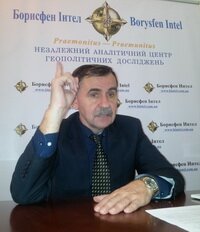 - No, I don't. That book simply describes the scenario of current events which you mentioned at the beginning of our conversation: “neither war nor peace”. Then, I argued that such a scenario would be realized. That is what we are witnessing after almost one and a half decades. As for the integration scenario, it did not work in Ukraine. It did work in Belarus, Kazakhstan, and Armenia. In Central Asia have been formed Khanates, they seem to have returned to the Middle Ages there. But again, under Russia's political patronage. The matter is that a different culture dominates there, and in what format they are going to be joined to Russia — is not clear. If the Russians seek to build a new Russian state on the basis of the “Russian idea” how to explain it, for example, to Tajiks or Turkmens? Therefore, they are destined to be Russian so-called caliphates.
- No, I don't. That book simply describes the scenario of current events which you mentioned at the beginning of our conversation: “neither war nor peace”. Then, I argued that such a scenario would be realized. That is what we are witnessing after almost one and a half decades. As for the integration scenario, it did not work in Ukraine. It did work in Belarus, Kazakhstan, and Armenia. In Central Asia have been formed Khanates, they seem to have returned to the Middle Ages there. But again, under Russia's political patronage. The matter is that a different culture dominates there, and in what format they are going to be joined to Russia — is not clear. If the Russians seek to build a new Russian state on the basis of the “Russian idea” how to explain it, for example, to Tajiks or Turkmens? Therefore, they are destined to be Russian so-called caliphates.
And now back to Ukraine and Trans-Dniestr. When the scenarios of re-uniting on the basis of signed agreements did not work, Moscow decided to resort to the next option — to blow up all these formations by military methods, and to keep them in a state of chaos. The RF being a sort of firm base. This way Moscow could influence the foreign policy of Ukraine and Moldova, blackmail them until at the right moment, it could “wring out” a certain part of their territory, occupy it without a shot, as it happened in the Crimea. And these spots of chaos would play the role of a springboard, with which then they could capture the entire territory, as delicately as it was done in the Crimea. One base of the Black Sea Fleet gave them the opportunity to seize the Peninsula without firing a shot. So I repeat again: Trans-Dniestr is a bridgehead. And so is Abkhazia.
What interests Russia in Trans-Dniestr? Only one thing does — the military presence. Nothing else.
I had a private conversation with a former Foreign Minister of the Trans-Dniestr Republic. He said that the operation to recognize the independence of Abkhazia, Trans-Dniestr, and South Ossetia was carried out simultaneously, by a command from Moscow. When, after the war in the Caucasus had been formed these so-called republics, he went to Moscow with a request to include into this process Trans-Dniestr too. And there they made it clear that without coordination of this issue with Ukraine, there would be no recognition of independence of Trans-Dniestr. Like, wait until we solve the problem of the further fate of Ukraine, we do not need another Kaliningrad enclave. So today “the problem with the fate of Ukraine is being solved”, occupation of its East continues, next in line is the Ukrainian South, inclusive with Zaporizhzhya, Mykolaiv, Kherson, Odessa regions with access to Trans-Dniestr. Should be implemented the idea of forming “Novorossia” from Trans-Dniestr through to Kharkiv region. This is the third stage. The fourth stage is storming of Kiev and elimination of the Ukrainian state, and of the Ukrainians — as a nation. However, the implementation of the last stage is very unlikely.
- Hryhoriy Mykolayovych, note that for some reason, nowadays, the most likely are things that seem unlikely.
- You know, the unlikelihood is confirmed by the fact that in Ukraine there is now a strong young Ukrainian nation, which does not like Moscow's plans. Maybe such an occupation could have been held, but not today. I think that Yanukovych would have surrendered our sovereignty to Moscow in exchange for his own third term of, for example, General Governor within the created “Novorossia”. But Maidan did not let him carry it out, so the fourth stage will not take place. But the war with Russia will not end at this. Here, like each of us, I have a feeling both, pessimistic and optimistic. Trans-Dniestr could have taught us a lot, but we did not rush to learn, and so were late with our conclusions. And we have paid with the Crimea and Donbas. And if do not draw conclusions in time, and do not stand our ground, it is not known what part of our country will remain the state of Ukraine.
- In fact, here has started the Third World War?
- Donetsk region is the outskirts of Europe, which is facing a military threat. Just Europeans have realized it too late. Now they really feel the breath of the coming war.
- Thank you, Hryhoriy Mykolayovych for visiting "Borysfen Intel" and kindly agreed to answer questions.
Interview was recorded by Oleg Makhno.


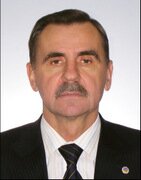 Perepelytsya Hryhoriy Mykolayovych
Perepelytsya Hryhoriy Mykolayovych